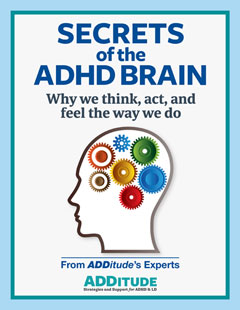The debate about attention deficit hyperactivity disorder (ADHD) is over. O-V-E-R. And the truth about ADHD and LD is clear.
Just about every mainstream medical, psychological, and educational organization in the U.S. long ago concluded that ADHD is real, and that children and adults with ADHD benefit from appropriate treatment.
Yet, somehow, the world still seems to be filled with self-appointed ADHD "experts" — some well-meaning, some sanctimonious — who insist on burdening us with their ill-informed opinions and asking repeatedly, What is ADHD?
We've all heard the comments: "ADHD is bunk!" "Can't people take responsibility for their own actions anymore?" "All that so-called 'ADHD kids' really need is discipline!" "Drug companies invented ADHD so they could sell stimulants." Blah, blah, blah.
We expect to hear such nonsense about ADHD and LD from misinformed movie stars ranting on talk shows. But what about the know-it-all who happens to be a friend? Your child's teacher? A co-worker — or your boss? What about a member of your own family?
Let's be honest: Words hurt. Holier-than-thou barbs, fault-finding, and finger-pointing can make you resentful and just plain furious. "Discussing ADHD can be as touchy as talking about politics or religion," says Susan Ashley, Ph.D., author of The ADD and ADHD Answer Book. "Feelings get hurt, defenses go up, and relationships suffer when there are disagreements about it." In extreme situations, families disintegrate, and kids and grownups who need help don't get it.
Should you bite your tongue and walk away? Make a sharp retort? Make an effort to educate the ignoramus? A jab to the nose might make you feel better, but it probably isn't the best solution.
Here are the five varieties of ADHD naysayers out there, and the right ways to respond to each.
The Skeptic
The Skeptic denies the very existence of ADHD, calling it a phantom that was cooked up as an excuse for bad parenting. He maintains that ADHD would go away if parents simply reined in their brats and stopped letting them run amok. What about the adults who say they have ADHD? "Why," says The Skeptic, "they just need to grow up and take responsibility for their shortcomings, rather than blaming an illness."
No one questions the existence of diabetes, heart disease, or migraine headaches, says Philip Levin, Ph.D., director of The Help Group/UCLA Neuropsychology Program. Yet, he says, people who don't know better question the existence of ADHD — despite a body of research indicating that it is a neurobiological disorder that affects 5 to 10 percent of children and 3 to 6 percent of all adults.
Given a wealth of evidence, the National Institute of Mental Health has concluded that ADHD is a real medical condition. So has the American Psychological Association, which includes ADHD in its Diagnostic and Statistical Manual of Mental Disorders, the bible of mental-health professionals. And the U.S. Department of Education requires educational institutions to provide special accommodations to kids with ADHD — it's the law.
When Suzanne Herman, of Tyler, Texas, encounters Skeptics, she tells them the reason they don't "believe in" ADHD is that they've probably been lucky enough never to have experienced it, either in themselves or in a loved one. "If my son could exert the control necessary to conform, he would," Herman says. "No child would choose to be isolated and punished constantly."
Indeed. "Unless ADHD hits close to home, one may never totally understand it," says Luanne Southern, the senior director of prevention and children's mental health at the National Mental Health Association in Alexandria, Virginia.
Shantella Benson, whose 10-year-old daughter has ADHD, takes another approach with The Skeptic: She simply steers the conversation to a more benign topic. "Changing the subject saves me from having to get into a heated conversation in front of my daughter," the Torrance, California, resident says. "I've been trying to help her learn to control her emotions. It wouldn't help to see me blow my stack."
Hard facts are often the best ammunition to use against The Skeptic. "Direct the skeptic to CHADD, order him a subscription to ADDitude or give him copies of relevant articles, and take him to a support group meeting," Southern says. If that doesn't convince him that ADHD is real, it's likely that nothing will.
When Elisabeth Carnell of Kalamazoo, Michigan, comes across people who pooh-pooh her nine-year-old daughter's ADHD, she gives them information about the condition and shares her experiences with it. If these strategies fail, she calls the errant comments what they are: "bull#!^@."
If you prefer sarcasm to scatology, try, "Gosh, it must be nice to be smarter than thousands of doctors, scientists, and psychologists."
Continue reading this article...





